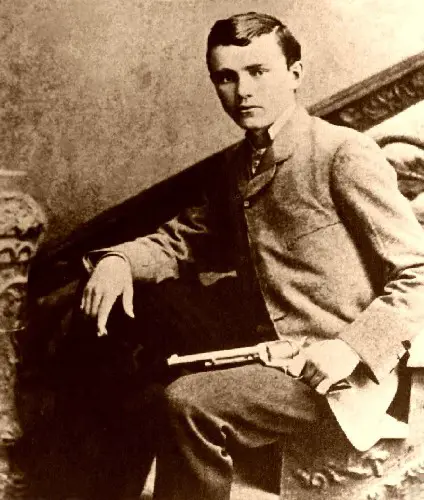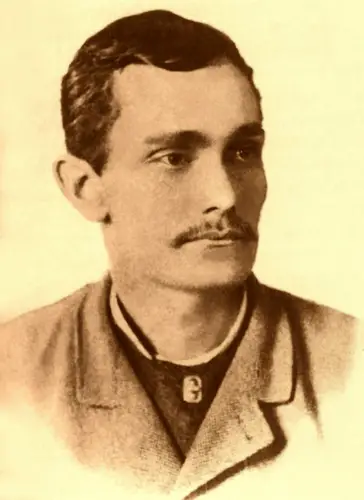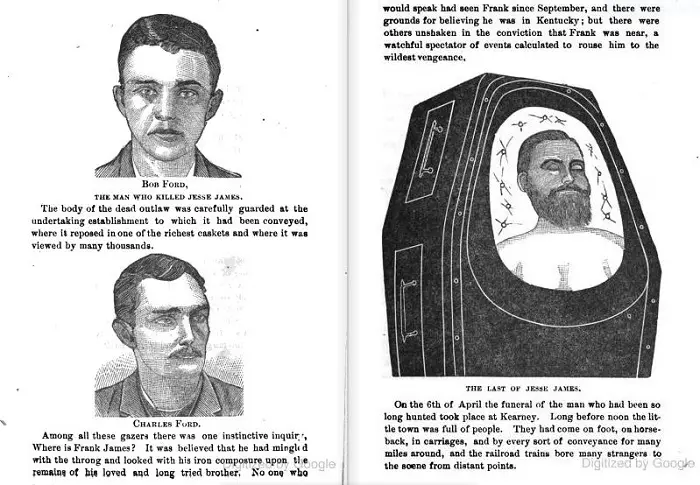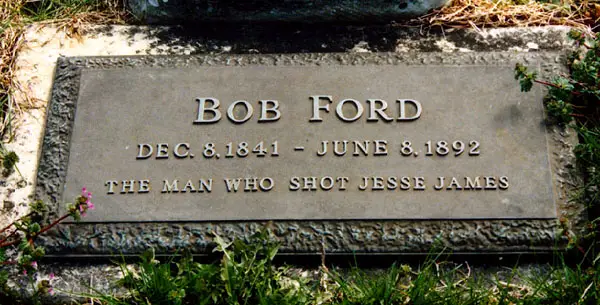Robert Newton Ford was an outlaw from Missouri born on January 31, 1862.
Like many young Missouri men of his time, he grew up admiring the Civil War record and exploits of the famous bandit, Jesse James, a fellow Missouri native.
Robert, who went by the nickname Bob, and his older brother Charles, finally got the chance to meet Jesse when they befriended him in 1880 while he was recruiting new members for his gang.
The James-Younger gang had disbanded in 1876 after a botched robbery and James was in need of new recruits.
Although he allowed Charles and Robert to join, neither brother played a large role in the gang. Charles did help Jesse rob a train in Glendale in September of 1881 but there are no records of Robert participating in any robberies.

Two of the gang members, Wood Hite, a cousin of Jesse James, and a friend of Ford’s named Dick Liddil, were on the run from the law in December of 1881 and taking refuge at the house of Robert Ford’s sister when an argument between Hite and Liddil got out of hand.
The men took shots at each before Ford stepped in and shot Hite in the head, killing him instantly. Fearing James would kill him and Liddil for murdering his cousin, Ford buried him in a shallow grave in the woods.
In January of 1882, Sheriff James Timberlake detained Ford and question him about Hite’s death. When authorities discovered he was a member of James’ gang, they offered to strike a deal.
According to Ford, on January 12, Governor Crittenden offered Ford a pardon for the murder and a $10,000 reward for the capture of either Jesse James or his brother Frank, dead or alive. Greedy and desperate to avoid prison, Ford agreed.
On January 24, Liddil surrendered to Timberlake and confessed to his role in Hite’s murder. His confession was later reprinted in the book The Trial of Frank James for Murder: With Confessions from Dick Liddil and Clarence Hite:
“…Next morning, I came down to breakfast, and Wood Hite, who had come from Kentucky three or four days before, was there, and Bob Ford came down a fw minutes afterward. When Wood Hite first came in he spoke to me, and I told him I did not want him to speak to me, as he had accused me of stealing $100 at the divide in the Blue Cut robbery. I told him he lied; he said he could prove it (his accusation) by Mrs. Bolton, and I wanted him to prove it. He then denied ever saying anything of the kind. I told him he did say it, and we both commenced drawing our pistols. We fired about the same time. He shot me through the right leg between the knee and the hip, and I shot him through the right arm. He fired four times at me and I five times at him, and then I snapped another barrel at him. I drew my other pistol when he commenced falling. Bob Ford fired one shot at him. I did not know this until afterward, when he (Bob) exhibited the empty chamber. The wound that killed Hite was through the head. It struck him about two inches above the right eye and came out in front of and a little above the left ear. Bob claimed that his shot was the fatal one. Hite lived 15 or 20 minutes, but did not speak. We carried him upstairs, and that night of Dec. 4, Cap and Bob dug a grave in the woods about a half a mile from the house and buried him. My leg was too sore to help. We did not use a coffin…On the night of Thursday, the twenty-ninth of December, Jesse and Charlie Ford came down to Mrs. Bolton’s, where I had been since being wounded and tried to get me to go with them. They claimed to have come from Nebraska. I declined to go. I mistrusted Jesse wanted to kill me and so left. This was on Saturday night, December 31, 1881. Jesse and Charlie left the next night for the old lady’s I was told. This was the last time I ever saw him, and I have never seen Charlie Ford since. After the raid on Mrs. Bolton’s house early in January, 1882, I concluded to surrender.”
Due to fears that Jesse James would kill him if he discovered he had killed Hite, Ford kept his arrest, as well as Liddil’s, a secret from James to prevent arousing suspicion.

Knowing what a quick draw James was, the Ford brothers knew they had to wait for a moment when James took his gun belt off in order to shoot him.
This moment came when James sat down to read the paper the morning of April 3, 1882 at his home in St. Joseph’s and he noticed an article about Liddil’s arrest for Hite’s murder.
Although James never said so, the Ford brothers worried that James was suspicious of them for not reporting the murder or arrest to him and decided it was time to act.
James’s son, Jesse James Jr, later recounted the events of that day in his book “Jesse James, My Father, The First and Only True Story of His Adventures Ever Written”:
“Father had not the slightest suspicion that the Fords meant to harm him. This is proven by the fact that after breakfast that morning father took off his belt and revolvers and threw them upon the bed and threw his coat over them. He did this because it was a very warm morning, and the belt and revolvers were tiresome to carry. Another reason was that it was necessary to have the doors and windows open, and father thought that people passing the house might be suspicious if they saw him armed. After my father put the revolvers upon the bed he noticed that a picture on the wall was hanging awry. He placed a chair beneath the picture and stood upon it to straighten it and then he started to brush the dust from it. Standing thus, his back was turned to the Ford boys, who were in the room. This was the opportunity the Fords had been waiting for. It was the very first time they had seen him unarmed since they knew him. Bob Ford drew his revolver, aim’ed it at the back of my father’s head and cocked it. Father heard the click of the hammer and made a movement as if to turn around. But before he could do so Ford pulled the trigger and father fell backward dead. The Fords ran out and across the back yard fence, and went down town and surrendered to the authorities, telling that they had shot and killed Jesse James. Years afterward the Fords, who found themselves despised of all men because of this murder, denied that they shot my father for the reward, but that they learned that Jesse James suspected them of treachery and meant to kill them, and they shot him for self protection. That this story was absolutely false is proven by the fact that immediately after the murder Charlie Ford sent the following telegram to the Governor of Missouri: ‘I have got my man.’ Charlie Ford practically admitted in my presence and hearing that he killed my father for the reward.
That conversation was held under the following circumstances: Nearly three years after the murder, when I was nine years old, I was in Kansas City with my grandmother. We were walking up Main street. I had hold of my grandmother’s hand. Suddenly I saw and recognized Charlie Ford coming down the street toward us. I knew him the instant I saw him, and I was very much excited. I said to my grandmother: ‘Here comes the man who killed my father.’ It was the first time my grandmother had seen him since that day he was at her home with father, ten days before the murder. The sight of him made her weak and she sat down on a box in front of a shoe store. Ford saw her and went to walk past with his head turned the other way, but she called to him: ‘You don’t know me, Charlie?’ He stopped and said: ‘Yes, I know you. You are Mrs. Samuels.’ ‘Yes, and you killed my brave boy; you murdered him for money. I ought to kill you,’ she said to him. He threw up both his hands in front of his face and answered: ‘Mrs. Samuels, don’t say that. If you only knew what I am suffering, you wouldn’t talk to me that way.’ ‘And what have you made me and mine suffer?’ she said. ‘Mrs. Samuels, I have been in the blackest hell of remorse ever since it was done. But I didn’t kill him. It was Bob did it,’ Ford said. ‘Yes, and you knew Bob intended to do it when you brought him to my house. You ate bread under my roof with blackest murder in your heart, and murder for money, too. There will come a day of terrible reckoning for you.’ I heard Charlie Ford tell my grandmother in that talk that he did not know that Bob intended to kill my father till they got to St. Joseph, and then Bob told him if he did not consent to it, he would kill him along with Jesse. Ford repeated over and over again, that he was suffering the worst agonies of remorse. The perspiration streamed down his face and there were tears in his eyes. He begged my grandmother to forgive him and she said: ‘If God can forgive you, I will.’ My grandmother asked him what he did with the $10,000 he got for murdering my father, and he replied: ‘Mrs. Samuels, before God, we never got but a few hundred dollars of that reward.’ I watched Charlie Ford closely while he was talking. I was only nine years old but I understood it all. I said nothing until he had gone on down the street. Then I said to my grandmother: ‘If ever I grow to be a man I’m going to kill him.’ My grandmother said to me: ‘You’ll never live long enough my son; God will never let an onery man like that live until then.'”
James was buried in the front yard of his parent’s farm in Kearney, where his mother could protect his grave from being desecrated, and marked it with a tombstone that read “Jesse W. James, Died April 3, 1882, Aged 34 years, 6 months, 28 days, Murdered by a traitor and a coward whose name is not worthy to appear here.”
Years later, James’ body was moved and buried with his wife in nearby Mount Olivet Cemetery.
Several newspapers applauded the Ford brothers for their actions while others criticized them for the manner in which they killed James.
According to the book “Son of a Bandit: Jesse James and the Leeds Gang,” The Kansas City Times wrote: “The general sentiment of the inner heart of all manner of men is that nothing in the recorded life of Jesse James equaled the infamy of the manner and mode” in which he had been killed.
Yet other newspapers, such as Rolla New Era, dismissed the uproar about the way he was killed and celebrated his death with a headline that read: “Jesse James, the Notorious Bandit Who Has Disgraced Missouri By His Lawless Acts At Last Dead!”

The public and press also attacked Crittenden for his alleged role in James’ death, spreading rumors that he had offered money to anyone who would kill James. Confederate veteran Major John Newman Edwards, who had written about James in his book “Noted Guerrillas,” accused Crittenden of hiring a “band of cutthroats and highwaymen to murder him [James] for money.”
On April 17, 1882, the New York Times reported that the Ford brothers were charged with the murder of Jesse James, plead guilty, were sentenced to be hanged and then pardoned by Crittenden all on the same day.
According to records for the Missouri General Assembly, Robert Ford was then indicted for the murder of Wood Hite on May 13, 1882. On October 26, he was tried and acquitted.
The brothers tried to continue on with their lives afterwards but their reputation as murderers combined with life on the run from Jesse’s brother Frank, who was trying to kill them, made life unbearable.
Charles Ford committed suicide in 1884. Robert attempted to earn a living off of his notoriety by posing for photos with the gun he used to kill James and starred in a play titled the “Outlaws of Missouri” where he recounted the day of the murder.
In 1889, a man attempted to kill Robert Ford at a casino in Kansas City. Ford described the event to the New York Times:
“One man made himself particularly obnoxious to me. He referred in an insulting manner to the Jesse James affair, but I took no notice of him, preferring to escape a row if I could. He continued to abuse me all the evening and I continued to take no notice of him. Early this morning. After I had been sitting at the table all night, I felt cramped and uncomfortable and leaned back in my chair. As I did so I threw my head back, and at that instant my abuser drew a knife from his pocket, held my head back by my hair, and was about to draw the knife across my throat when my friend warded off the blow. The knife cut through the collar my collar and grazed my neck, inflicting a slight wound. I was unarmed, or I would have shot him on the spot. As it was he took to his heels and escaped.”
A few years later, Ford opened a tent saloon in Creede, Colorado in June of 1892. On June 8th, a man by the name of Edward O’Kelley, a possible member of a gang Ford had quarreled with, walked into the saloon with a sawed off shotgun, said “Hello Bob” and shot Ford in the chest, killing him instantly.
Ford was buried in Colorado but his body was later moved to Richmond City Cemetery in Missouri. His headstone, which accidentally lists his birthday as 1841, reads: “Bob Ford, Dec. 8 1841 – June 8, 1892, The Man Who Shot Jesse James.”

Sources:
PBS.Org: The Death of Jesse James: www.pbs.org/wgbh/americanexperience/features/general-article/james-death/
New York Times; Bob Ford’s Narrow Escape; December 1889: query.nytimes.com/mem/archive-free/pdf?res=9406E7D7133AE033A25754C2A9649D94689FD7CF
New York Times; The Ford Brother’s Indicted, Plead Guilty, Sentenced to Be Hanged, And Pardoned All In One Day; April 17 1882: query.nytimes.com/mem/archive-free/pdf?res=9D04E3DB113EE433A2575BC1A9629C94639FD7CF
New York Times; Jesse James Murderers; April 18 1882: query.nytimes.com/gst/abstract.html?res=F10810FA3A5A11738DDDA00994DC405B8284F0D3
“Journal of the House of Representatives of the Thirty Second General Assembly of the State of Missouri “; Missouri General Assembly; 1883
“Son of a Bandit: Jesse James and the Leeds Gang”; Ralph A. Monaco; 2012
“The Trial of Frank James for Murder: With The Confessions of Dick Liddil and Clarence Hite”; Frank James, James Andrew Liddil, Clarence B. Hite; 1898
“Frank and Jesse James: The Story Behind the Legend”; Ted P. Yeatman; 2003
The State Historical Society of Missouri; Famous Missourians; Robert Ford (1860-1892): shs.umsystem.edu/famousmissourians/folklegends/james/jamesford.html
“Jesse James, My Father, The First and Only True Story of His Adventures Ever Written”; Jesse James Jr; 1906
“Jesse James Was His Name”; William A. Settle

reading about Jesse James i still say that his death was faked by him and ford as the same as billy the kid and butch cassidy and the sundance kid .the tale of Jesse is that he went to Texas under the name of James Courtney and passed away 1942 i think .. in them days it was done a lot by outlaws to escape the law
.. remember the film with Glenn ford THE FASTEST GUN A LIVE
Fastest Gun Alive was fiction. Though, Glenn Ford was the fastest draw in Hollywood, the movie was still fiction.
There are many stories of the old West and those whose exploits made history but you are the first I’ve heard that Jesse James and Billy the Kid’s deaths were faked. I suppose the pictures of their corpse’s are also faked? I find that hard to believe. Frank and Jesse James did change their names and occupations in order to escape their reputations, but I’ve never heard even a rumor Jesse faked his death.
Interesting but I find it hard to believe.
Funny, Judge Ross was raised by Jesse Jr. Ross who passed away in 2005 I believe, whom I have met and talked to said Jesse had told him about the day his dad was shot and killed. He even was a member of the group that did the DNA testing that came up confirming that it was in fact Jesse. The only thing that Betty Dukes claims have done is keep the Jesse James family in the spotlight. She was a true nutcase. But a lot of people believe her, but she has no proof. Now that she passed away last year, I am sure the controversy will die. If those believers would go to the family farm in Kearney, MO and check the place out, and maybe meet Betty Barr, Jesse’s Great Grandaughter, you will see and hear the truth.
bob ford was my moms great grandfather. bobs kids and ither relatives hid in plain sight as a travelling circus, called the free circus, as for reasons of safety the family name was changed from ford to free. my aunt has many b&w ohotos of the family circus. My grandmother Georgia was a trapeze artist and her sister Connie was marveled as “the strongest little girl in the world” in newspapers. I am not sure if it was the gun that killed Jesse James or not, but my mother did have a gun that was Bob Ford’s. I’ve heard two different stories about what happened to the gun, and as my mother is dead I will never know exactly what happened. One story I was told was that as my mother had issues and was a drama queen, and got into an argument with her husband and who subsequently threatened to kill himself. apparently it got ugly and the police came and confiscated the gun. My mother and stepfather were not very responsible people and let it go, according to the story. My brother, however, claims that they pawned the gun near la porte county, IN and never got it back. Either way it’s a shame that they ended up in with the fancy , silver and ivory antique beauty instead of my aunt, who would have treasured and cared for it til this day. Weather that was really Jesse James’s body is anybody’s guess, though with the ordeal that the Ford brothers went through was very real, I had been told that they had a hard time from being hated and heckled by james-loving &celebrating society and had to go “underground” to survive.
Wow, that’s a fascinating story. Does your family have any photos of that gun? Did it look like the gun that Bob Ford is holding in that famous photo of him where he is posing with the gun that killed Jesse James?
he date of birth on the tombstone is wrong.
Robert Newtonford (* 1860 in Ray County, Missouri, June 8, 1892 in Creede,
Colorado), … Robert Ford was the youngest of three sons of James in 1860
Thomas Ford and his wife Mary Bruin.
Yes, I know that. It’s why I mention in the article that it is wrong.
that date is very wrong its 1862 jan 31st to 1893
my name tim owens i live in green county arkansas i have three tintypes of i bleave to be jesse in fact i have a photo of him and bell star that dates right and it has a stage coach strong box in the corner and bell pointing at a ring on her finger.another that apears to be of jesse and ford close to the time he was shot and he seems to have a watch chain with a c or horseshoe its hard to say the chain is over it id say photo is 1881ish. the third is a young jesse probably 1866 its portrait of chest and face.the one with bell there are two ladys cant tell but think its zee or bell daughter 1872-74 defenitly a stongbox and jewlery .a cigar but on floor in both it and the 1881 photo.
What is charles and robert fords autographs worth?
If I was going to kill Jesse James I would have shot him in the back too. Only smart thing you could do if you decided to take the law up on the deal. Bob and Charles Ford are my Great Great Great Uncles. There oldest sister Sarah Ford is my Great great Grandmother. So I guess we think alike. Make no mistake Jesse was a murderer too. V.J. Scott
Wow, you’re related to Bob and Charles? That’s so cool!
I too have some James related tintypes. Including Charley and Bob, likely taken right after. Right after Charley and Bob more or less became “dandys” and preformed on stage. No doubt to me this tintype is them. The James girls in my photos date about 1870 era. There’s Belle and several of Frank 1860 to 1883. I think most of Frank and Jesse date to the Nashville era? These being the hardest to confirm. This includes possibly Jesse’s son and dauther? They came together, digitally match known photos. Research ongoing with friends and Ford family members. May this serve notice to the haters, the “Fraker. Collection” is just and here to stay.
Bob Ford was a snake and a coward, he shot Jesse James in the back to save his own bacon pure and simple. I wonder if Frank James ever tried to catch up with him?
Shooting someone in the back like that is pretty cowardly. Frank did hunt both him and Charles down for years. It got so bad that Charles killed himself because he was tired of living on the run from Frank.